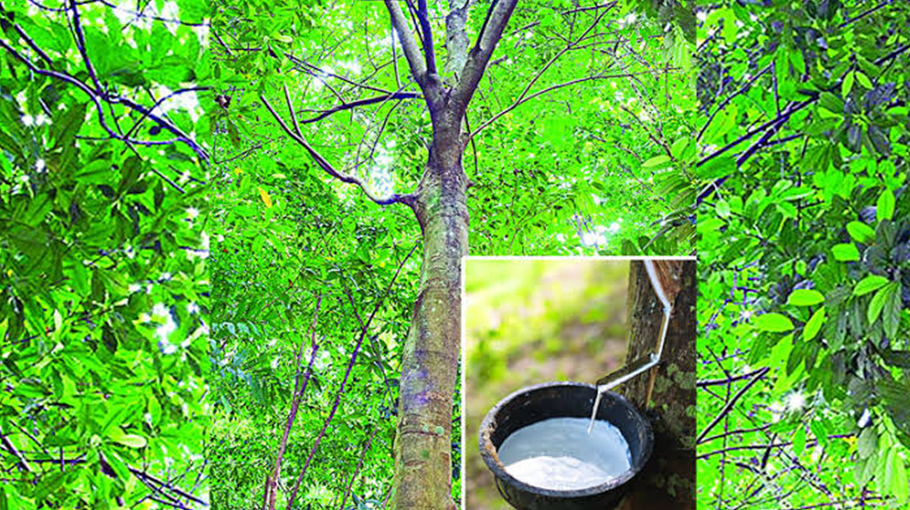Rubber cultivation eco-friendly, promising sector: Speakers

A natural rubber and rubber-based industrial fair is going to be inaugurated for the first time in the gymnasium adjacent of MA Aziz Stadium in the city and with the participation of the stakeholders and rubber-based industries related to natural rubber cultivation under the initiative of Bangladesh Rubber Board, Chattogram.
The fair can have as many as 50 stalls. The special attractions of the fair will be seminars, quizzes, drawing and writing competitions, rubber farming and industrial products based video displays and collection of industrial products. There will be exhibition and buying and selling opportunities.
The Rubber Industry Fair will be held from September 7-14. The fair will be open to all from 9 am to 8 pm.
Environment, Forest and Climate Minister Md. Shahab Uddin will be the chief guest at the Rubber Industry Fair, Deputy Environment Minister Begum Habibun Nahar will be the special guest. Bangladesh Rubber Board, Chattogram Chairman Syeda Sarwar Jahan will presided over the event.
Rubber is a very valuable financial asset. Known as “white gold”, the rubber tree produces more than just the precious rubber. These trees play an important role in protecting the natural balance of the environment.
This tree absorbs more carbon dioxide than any other plant. Studies have shown that each hectare of rubber plantation (which has 415 productive rubber trees) absorbs 33.25 tonnes of carbon from the atmosphere annually, which is crucial in preventing global warming and protecting the environment.
While rubber cultivation can play a significant role in economic development, it also contributes equally to environmental protection. If rubber is cultivated up to the lower part of 35 degree slope it prevents soil erosion. Rubber plantations also play a role in conservation of biodiversity, habitat for wild animals. Poultry, cows and goats can be farmed in the rubber garden. Turmeric, ginger, lemon, malta, cashew, amrapali are all companion crops that can be cultivated.
Rubber is being cultivated in Raojan, Dabua, Haludiya, Dantmara, Nulukho, Ramu, Kanchannagar, Rangunia, Sylhet's Bhatera, Satgaon, Rupaichra, Shahjibazar, Mymensingh's Phulbaria, Tangail's Madhupur, Sherpur, Khagrachari, Bandarban, Rangamati, Cox's Bazar.
There are 1304 private gardens, 29 government gardens, various multinational corporation gardens and private gardens across the country. Rubber production time is round the year. But the maximum rubber production is from October-January.
Although rubber wood is used as fuel, currently BFIDC's industrial units are processing and seasoning it to produce various types of high-quality furniture such as sofa sets, beds, doors and windows, dining tables, chairs etc. The quality of treated and seasoned rubber wood is equal to that of teak wood, which is extremely durable and beautiful.
The Bangladesh Rubber Board was established on 5 May under the Bangladesh Rubber Board Act, Act No. 19 of 2013. As the Rubber Board has no manpower of its own, Bangladesh Forestry Industries Development Corporation (BFIDC) has been entrusted with the responsibility of managing the official activities of the Board from its inception to mid-2019. Bangladesh Rubber Board started functioning as a separate department from 30 April 2019.
According to a statistic, Bangladesh Forest Industry Development Corporation earned between 100 crore and 150 crore Tk annually by exporting rubber abroad from 2009-2012. At present, for the sake of the country's rubber industry, measures should be taken to save foreign exchange by stopping the import of rubber from abroad. Bangladesh Rubber Board was established by the government in 2013 to formulate and implement future development plans to make rubber farming in Bangladesh profitable, create opportunities for public participation, provide cooperation to rubber farmers.
Bangladesh Rubber Garden Owners Association has demanded appropriate measures to be taken to save labour intensive, foreign exchange saving and environment friendly rubber cultivation in the context of economic, business, trade and industrial production being disrupted and destroyed due to the global outbreak of coronavirus. For this purpose, the organization has various demands including withdrawal of VAT imposed on rubber, facilitation of plantation transfer and renewal and introduction of bank loans
Its mentioned that the multiple uses of natural rubber are recognized worldwide. Industries, communication equipment, road carpeting, aircraft, buses, trucks, private cars, baby taxis, motorcycles, rickshaws, bicycle tyre-tubes, slippers, hose pipes, rubber soles, buckets, gaskets, oil seals, jute and various textile industries. Materials, foam mattresses, battery boxes, springs, rollers, hot water bottles, seals, condoms, cookware, wetsuits, conveyor belts, pads, bumpers, rubber mats, non-slip floor mats, boat mats, surgical gauze, various medical supplies, pacifiers, Toys etc. are made from rubber. A wide variety of products are produced from rubber.



